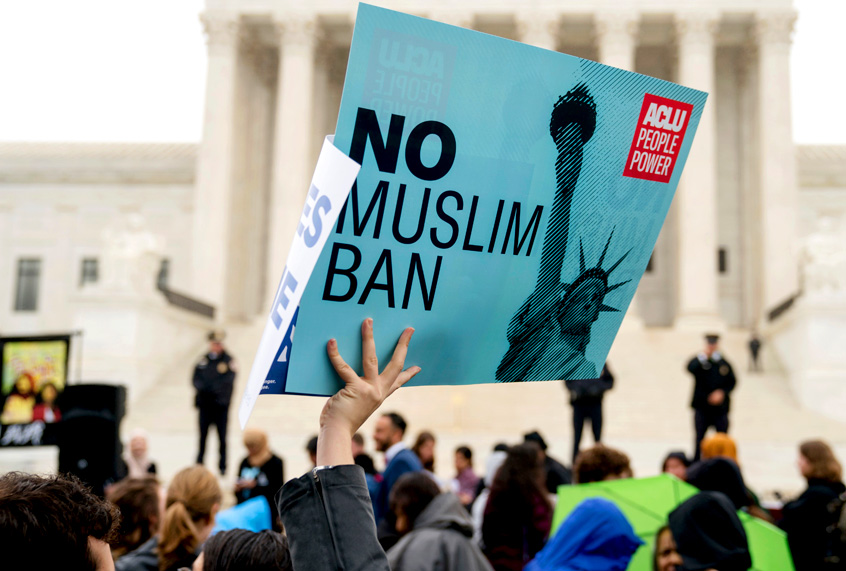When a Muslim customer at a California coffee shop was verbally harassed by an Islamophobic man recently, an employee and several patrons quickly jumped to her defense.
“Is this Halloween or something?” a man at a Riverside Coffee Bean & Tea Leaf said to a young woman dressed in a niqab, a full body cover worn by some Muslim women. In a video recorded by the young woman, the man soon jumps into a hateful diatribe against members of the Islamic faith.
“I don’t like that because I don’t like your religion. It says to kill me, and I don’t want to be killed by you, how’s that?” the man shouts.
“Are you scared of me? Have you read the Koran?” the woman asked.
The man, undeterred by his apparent ignorance of Islamic faith, shot back that he had read “enough of it to know” what he was talking about, adding that he “absolutely” identified as a Christian.
This incident occurred on Friday, according to a report by KTLA-TV, and incidents like these are growing all too common.
"I'm a Muslim [woman]."
"I know your religion and I don't want to be killed by you."
This took place at a cafe in California yesterday. pic.twitter.com/4WAWKcQDh8
— CJ Werleman (@cjwerleman) May 12, 2018
The ultimate outcome, in this case, was positive.
Another customer can be heard intervening on behalf of the Muslim woman: “Get out of here, you f*** racist.” A barista who identifies herself as the supervisor then explains to the loud bigot that he would not be served at their store “because he’s disrupting a public place and being very racist.”
An individual who claimed to have made that comment in defense of the Muslim woman later told KTLA-TV that another customer began bothering her after the man left.
“I think, unfortunately, it’s very hard to put a number on and quantify these types of incidents because of a couple of things,” Madihha Ahussain, special counsel for anti-Muslim bigotry at Muslim Advocates, told Salon. “(1) They’re hard to document. These types of incidents wouldn’t necessarily rise to the level of a hate crime that might be reported or acted upon by law enforcement, necessarily. (2) The other reason that they’re difficult to quantify is that they are happening so frequently and they’re not always being reported.”
Hussam Ayloush, the executive director of the greater Los Angeles area office of CAIR, pointed out that these kinds of spontaneous confrontations are tragically common within the American Muslim community.
“Unfortunately, such incidents are becoming way too common and often and frequent, I would say, for many Muslims, especially for those who are visibly seen or perceived as Muslims,” Ayloush told Salon. “And we have statistics for that, actually. Last year we had about 2600 anti-Muslim bias incidents reported to CAIR offices nationwide.”
As Ahussain noted, part of the problem is that America’s political discourse has made this kind of anti-Muslim hatred seem acceptable.
“There has been a trend in the increase of hostility toward American Muslims and those perceived to be Muslim around the country,” Ahussain told Salon. “So that leads to a normalization of this type of behavior where, unfortunately, people may just expect it as part of the norm and they may not feel as inclined to report or take any action.”
She added, “Anecdotally, we have definitely seen that these incidents are occurring very regularly throughout the country.”
Yet if there is one silver lining to this particularly ugly cloud, it is that so many people at the California cafe were quick to do the right thing.
“Like any incident of hate, there is always anxiety and worry about the safety of the target of such hate. And in this case, we’re very relieved that she’s safe,” Ayloush told Salon. “But also what made this case unique is the fact that the store employee, as well as the patrons at the store, both acted in ways that we hope people would act, and that is to come to the aid of the victim of bigotry. Show support and make the assailant know that this is not acceptable behavior. And that this is how we can defeat bigotry, by making it socially unacceptable as a behavior.”
That may be the most important takeaway from this incident. If Americans want to reduce prejudice in our culture, they need to start by making it clear that those who act hatefully toward others will not be accepted within polite society. The regression in our public ethos that has occurred under President Donald Trump does not have to be reflected in our everyday culture, even if Trump himself often makes it hard to forget about it. If enough decent people take a stand, the bad apples can be shamed into no longer hurting innocent people.
“I think if we look back to even before the election with the campaign cycle, and then with the election results as well as the new administration, I think there is absolutely a relationship between what we’re seeing in terms of the daily lives of American Muslims and, to be quite frank, for a lot of other groups,” Ahussain told Salon. “Whether it be immigrant communities or the black community, LGBTQ individuals. I don’t think that this is necessarily an isolated experience for Muslims, but I do think that there has been, going back to what I said earlier, a sort of normalization of bigoted rhetoric because we’re seeing that in the highest levels of authority within this country.”
She added, “It was really great to see that the shop employees were not going to allow that to happen in their space.”

